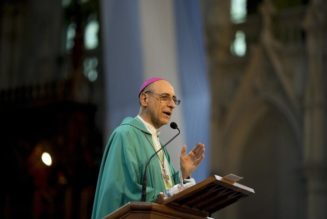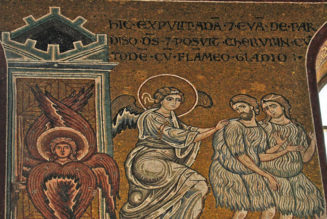
You might not think penance would be so popular, or that the average person in our generally feel-good culture likes being reminded that they’re dust. Yet the numbers don’t lie: Ash Wednesday is one of the most popular days to come to church, especially for non-practicing Catholics and even non-Catholics.
To try to get some insight into this phenomenon, and to discuss how we can all have a more fruitful Lenten season, the Register spoke with three Catholics ministering to different communities across the country: Jule Coppa, a campus minister at the Penn Catholic Newman Center in Philadelphia; Alma Cuate, a catechist and member of the parish council at the Church of the Assumption, a predominantly Latino parish in the Minneapolis suburb of Richfield; and Father Michael Kapperman, parochial vicar at Sacred Heart Parish in the rural South Dakota town of Aberdeen.
Ash Wednesday is a very popular day to come to church, even for people who don’t regularly practice their faith. Is this true in your community, and, if so, why do you think that is? How can it be an opportunity for evangelization?
COPPA: This is certainly true for our Newman Center community. There have been years where we’ve seen triple the Mass attendance on Ash Wednesday compared to an average Sunday. There is something about Ash Wednesday that is so visible, so uniquely Catholic, that even dormant Catholicism wants to rise to the occasion for it. The beginning of Lent calls for a fresh start and for making a return to God. These themes definitely aid our outreach and evangelization efforts, because not only are new people showing up, but they also seem to be more receptive to changing things up and making prayer and Church activity part of their Lenten practice.
CUATE: Ash Wednesday is very popular and highly recognized in the Hispanic/Latino community. Although it’s not a feast day, it’s the beginning of what leads to Holy Week and Easter, which are very culturally significant for most Latino people, even if they’re not going to church at other times of the year. So similar to the way some might see the feast of Our Lady of Guadalupe (Dec. 12) as a day that points to Christmas and getting ready for it, I think Latinos connect Ash Wednesday with Holy Week and Easter. They know that if they want to celebrate those “big days” well, they have to start preparing ahead of time. With so many people at Mass on Ash Wednesday, we invite everyone to join us for all of Lent, especially our times of prayer and formation. It’s really a way to draw them more deeply into the regular life of the Church.
FATHER KAPPERMAN: Yes, Ash Wednesday is very popular in our rural community, as we have similar numbers to our Christmas and Easter Masses. I think that the reason so many people make it a priority to partake in the Ash Wednesday liturgies is that this Mass speaks to the existential experience of the human person. All of us are plagued by our choices and our sins. At the core of the human person is this need and desire to acknowledge one’s own sinfulness and our fragile condition. The liturgy of the Church perfectly speaks into humanity’s fragility when she says, “Remember you are dust and to dust you shall return.” This then provides the perfect opportunity to proclaim the Good News of Jesus Christ, for into this, the Church can say, “Though you are destined for dust, there is One who can give you everlasting life. Come and follow him this Lent.”
What are some misconceptions you come across regarding Lent, and how do you help your people see what this season is really all about?
COPPA: I think it’s pretty common for people to perceive Lent as a 40-day guilt trip, a diet, or a competition for who can sacrifice the hardest thing. We try to provide our students with a more nuanced and complete context by offering talks at our weekly “Newman Night” about the spiritual significance of Lent and its practices, distributing a well-rounded list of “ways to live your Lent,” which includes the three pillars of prayer, fasting and almsgiving, and by offering a guided “busy persons retreat” to provide weekly accompaniment throughout the season.
CUATE: A big one is that people think Lent is only about giving up meat on Fridays. Our priests do a really good job to remind parishioners that this season is really about renewing our relationship with the Lord and our whole community. One of our priests is hosting a class every Monday in Lent about “getting back to basics.” He will speak to Catholics and also some non-Catholics about “the basic, foundational understanding of what we believe Christianity is all about.” During Lent, we offer formation as much as we can to the community. Our priests also encourage us to attend daily Mass. They’ve even increased confession times so that the sacrament is available daily, offered 30 minutes before every Mass.
FATHER KAPPERMAN: What I notice is that people are great at understanding that Lent is to “deny ourselves.” I encounter people, Catholic and non-Catholic, who give up things for Lent mostly because they acknowledge that we are enslaved to different things (technology, food, etc.), and they desire to be free from these attachments. But what is often missed is the rest of that biblical passage in which Jesus says to also “take up our cross and follow him” (Matthew 16:24). The essence of Lent is not just to deny ourselves, but ultimately come into a closer relationship with Jesus Christ. We deny ourselves to follow Him more closely.
Speaking of Lenten disciplines, what are some recommendations you make to the people you serve? Also, what kinds of communal Lenten practices seem to be fruitful?
COPPA: As a Newman Center, we offer a wide array of activities that span prayer, formation, and service during Lent. But when chatting with students one-on-one, my Lenten advice is always to keep it simple and keep it meaningful. What is one attachment or obstacle that interferes with their relationship with God? Can they put it aside for Lent and replace it with something life-giving? I think sometimes simple questions like that can lead to a fruitful Lent. As far as communal practices, I’m always surprised and moved by the consistent attendance we have at our Friday Stations of the Cross. It seems to be one concrete way that our students and parishioners try to pick up their cross during Lent.
CUATE: I encourage our confirmation candidates to not just give up something, but to substitute it with an act that helps them recognize the Lord. For instance, swap out time looking at a screen with lectio divina [prayerful reading of Scripture], which you can do individually or as a family. We encourage people to live out Lent with Christ by “carrying their cross” — whether it’s the loss of a loved one, a difficult marital situation, or a time of sickness — and offering opportunities to spend time with Jesus in prayer, like adoration on Fridays. Some fruitful communal practices are praying the rosary and going to confession as a family. And, of course, participating in the Church’s liturgies.
FATHER KAPPERMAN: The recommendation I give to my parishioners is to give up use of technology (in particular the use of our phones) in order to create a space of silence. I notice often both in myself and in others that phones take us away from encountering the reality in front of us in order to replace it with a false and distant reality. But this surrender of the use of technology to create silence is not for silence’s sake. Instead, it is to create a place of silence within our hearts that can then give rise to us encountering the presence of God. In this disposition of a silent heart before God, it allows us to see more fully his love for us and his desire for our lives.
Finally, what Scripture are you keeping close to your heart as you begin your Lenten journey?
COPPA: The second reading on Ash Wednesday from 2 Corinthians ends with, “Behold, now is a very acceptable time; behold, now is the day of salvation.” These words are definitely echoing in my heart as I step into Lent! I think sometimes I am waiting for some distant future day before I give my whole self to the Lord, or when I ponder the Paschal Mysteries it can be easy to imagine them as a historic event in the long distant past. But Jesus is doing the work of salvation now, and it is in the present moment that I have the chance to participate in it and return to him. It’s with that sense of hope and urgency that I want to enter into Lent: truly believing that we are not just commemorating something that happened a long time ago, but that we are actually walking with Jesus toward Calvary and toward his resurrection and ours.
CUATE: “But when you give alms, do not let your left hand know what your right is doing, so that your almsgiving may be secret. And your Father who sees in secret will repay you” (Matthew 6:3-4). It gets at the heart of what should motivate us during Lent. It also helps remind me that what I am doing for others is not for my gain nor for it to be flaunted, but for the Lord himself to see his works in my heart.
FATHER KAPPERMAN: “From his fullness have we all received, grace upon grace” (John 1:16). What strikes me about this passage is that all the graces we receive flow from what the Heart of Christ first received. The Sacred Heart of Jesus is filled with the loving gaze of the Father and is filled with the power of the Holy Spirit. From this overflowing love, Jesus then proclaims the Gospel to us. This culminates then in his passion, death and resurrection. The words and deeds of Christ during Holy Week are a fruit of the love that filled the Sacred Heart. This passage helps me to see that my heart is meant to be filled with the same things that filled the Heart of Christ. With my heart now filled with the same love that fills the Sacred Heart, I’m then strengthened in my work of proclaiming the Gospel, for we hear that “From the fullness of the heart the mouth speaks” (Luke 6:35).
Join Our Telegram Group : Salvation & Prosperity









